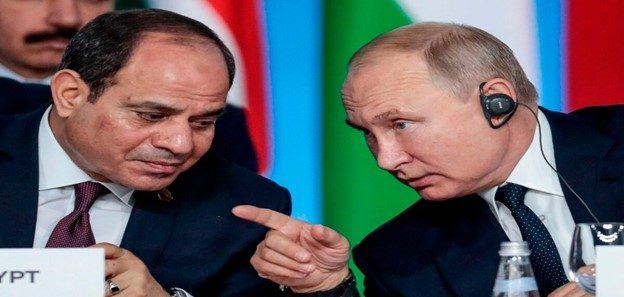
Instead of decrying Russia’s invasion of Ukraine, Sisi phones Putin on “strategic partnership”. Meanwhile, the United States will again provide $1.3 billion in military aid to Egypt—the same amount Congress has appropriated since 1987.
As Ukraine and the G7 countries press Egypt to condemn and take action against Russia’s invasion of Ukraine, al-Sisi held a phone call with Vladimir Putin today to discuss developing what Russia called their “strategic partnership”
On 9 March, Vladimir Putin had a telephone conversation with Egypt’s Abdel Fattah al-Sisi.
Ukrainian Charge d’Affaires in Egypt Ruslan Nechai recently revealed that Ukraine had submitted an official request for weapons and other military aid, financial support, and humanitarian aid from Egypt, as well as an end to its position of “neutrality.”
Putin and Sisi discussed further development of the strategic partnership between Russia and Egypt, including major joint projects in nuclear energy and industrial production.
Both parties expressed interest in continuing close cooperation in tourism and agriculture.
In addition to his call with Putin, al-Sisi traveled to Riyadh yesterday to coordinate a response with Saudi Crown Prince Mohammed bin Salman. Al-Sisi was also seeking support in light of Egypt’s growing economic problems, themselves exacerbated by the Ukraine war.
Egypt’s government has been attempting to formulate a plan to deal with rising prices, particularly of wheat and other basic commodities. In better news on that front, Finance Minister Mohamed Maait said that once the local harvest is completed in May, Egypt will have enough wheat reserves to meet domestic demand for eight months.
According to a Russian official statement, at the request of Abdel Fattah al-Sisi, Vladimir Putin explained the reasons for and goals of the special military operation to protect Donbass and spoke about Russia’s efforts during the talks with Ukrainian representatives.
Egypt’s Sisi thanked Russia for the efforts to evacuate Egyptian nationals from the conflict zone. The two men agreed to maintain contact at various levels.
US military aid to Egypt continuing
Meanwhile, the Congress’s Fiscal Year (FY) 2022 Consolidated Appropriations Act, released on March 8, would again provide $1.3 billion in military aid to Egypt—the same amount Congress has appropriated since 1987—though it contains a number of differences from previous years.
Of the $1.3 billion, a total of $320 million is conditioned on human rights, $20 million more than in the FY21 omnibus. The secretary of state can waive the conditions on $235 million of that amount if he concludes that doing so “is important to the national security interest of the United States.”
Those conditions include Egypt’s government strengthening the rule of law and democratic institutions, implementing reforms that protect fundamental freedoms, holding Egyptian security forces accountable for human rights violations, and investigating and prosecuting cases of extrajudicial killings and forced disappearances.
The remaining $85 million of conditioned assistance is not subject to a national security waiver, a $10 million increase from the previous year’s omnibus. It will only be released if the secretary of state determines that the Egyptian government is “making clear and consistent progress in releasing political prisoners, providing detainees with due process of law, and preventing the intimidation and harassment of American citizens.”
In a rebuke of the Biden administration’s actions last September, when it used a dubious reading of the FY20 law to withhold only $130 million rather than the $300 million intended by Congress, Egypt has been removed from the allocation tables.
Another element of that legal strategy, however—a clause about funds for counterterrorism, border security, and non-proliferation not being subject to the waiver—has again been included, which POMED Director of Advocacy Seth Binder called “a major loophole in the law [that] messages to the administration that their decision was OK.”
The act’s explanatory statement also requires reports on “incidents of harassment, threats, and arbitrary detention against American citizens, and their family members in Egypt and the United States” and on April Corley, who was left permanently disabled by a 2015 attack by Egyptian security forces that killed 12 people.
The bill still needs to be passed by both the House of Representatives and the Senate before being signed into law by the president.



